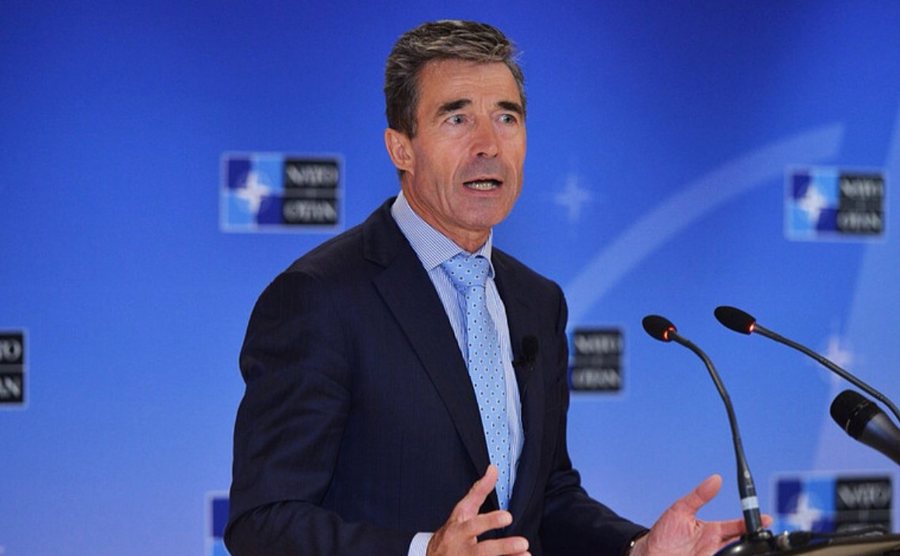
Former Secretary General of the North Atlantic Treaty Organization (NATO), Anders Fogh Rasmussen, told Radio Free Europe that preparations for a European force to be deployed in Ukraine after a ceasefire or peace agreement are "going very slowly" and that the entire European security model was "at a turning point."
"I don't want to see a coalition of the willing turn into a coalition of the willing," Rasmussen said, referring to a plan announced by British Prime Minister Keir Starmer in London on March 2, A2 reports.
Since then, there have been a series of meetings at various levels. However, key questions about the mission's mandate, rules of engagement, and which countries will send troops have yet to be publicly answered.
"In principle, in Europe, we spend a lot of time discussing and talking, and there are few efforts at action," Rasmussen said.
"However, I hope that [Russian President Vladimir] Putin's attack on Ukraine and the election of [Donald] Trump [president in the United States of America] will serve as a wake-up call to show Europeans that we need to act quickly," he added.
Rasmussen spoke in a wide-ranging interview on military issues, economic security and US President Trump's repeated comments about taking Greenland from Denmark.
He was prime minister of Denmark before serving as secretary general of NATO from 2009 to 2014.
"It is shameful to threaten Denmark, a close ally, with military means to occupy Greenland," Rasmussen said.
"I don't think it will happen. But clearly, there is the potential to create a division within NATO when you threaten an ally," he said.
Since leaving his role at NATO, Rasmussen has founded the non-profit organization Alliance for Democracies, which aims to counter what he describes as the global rise of "autocrats and dictators."
Last week, the group announced a five-point plan for European defense that includes a call to increase defense budgets to four percent of Gross Domestic Product (GDP) by 2028.
This follows moves by the European Union and Europe's major military powers - Britain, France and Germany - to increase defense spending in the coming years, but goes beyond the plans announced so far.
"Russia's defense investment is now greater than the combined defense investment in the rest of Europe. So, we need to accelerate. We need to at least double European defense investment," Rasmussen told Radio Free Europe.
"For too long, we have supported a model that no longer works — a combination of cheap energy from Russia, cheap goods from China, and cheap security from the US," he added.
Topics such as security and economic issues were a main topic at a conference that Rasmussen organized last week in Copenhagen, where the five-point plan was also discussed.
The 72-year-old veteran of politics and diplomacy singles out the Trump administration's global tariffs as a new danger that has created the need for a kind of "economic NATO."
"The Trump administration declared a trade war against the entire world, except for Russia and North Korea," he said.
“I would suggest creating what we call the D7, the seven democracies of the world: the European Union, the United Kingdom, Canada, Australia, South Korea, Japan and New Zealand. And I think the backbone of that would be what we would call an economic Article 5. We would consider an attack or coercion on one of those seven countries as an attack on all of them, and we would respond collectively,” he added.
It is surprising to hear a former NATO chief exclude the United States from a list of global democracies.
"Yes, but the United States has chosen isolation... I don't see an American willingness to exercise global leadership of the free world. So, for that reason, the US has been excluded from this D7," Rasmussen said.
Governments around the world are grappling with the challenge of how to respond to Trump's tariffs. Closer cooperation and trade with other partners are undoubtedly part of their calculations.
But, as with defense spending, Rasmussen's proposals go far beyond what is being considered in most capitals.
For example, the European Union's much-discussed free trade agreement with four South American countries in the Mercosur group has been mentioned as part of the EU's collective response to a new environment, but France is still very cautious about ratifying it.
Meanwhile, the EU and individual countries have reacted separately to the US tariffs, seeking to negotiate with Washington rather than form a united front.
Rasmussen offers no simple answers to resolving the complex web of interests that make it difficult for many countries to create new global structures. But he says it is a challenge that must be overcome.
"For the 19th consecutive year, we have seen a decline in global freedom and democracy. So now is the time to build stronger cooperation," he said.
"I know from experience with Putin and other autocrats that they only respect strength, unity and a firm stance... If we act together, if we act united, then we can oppose the autocracies that are advancing," he concluded./ REL (A2 Televizion)











